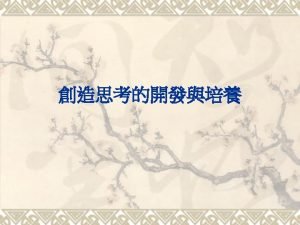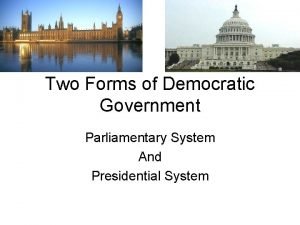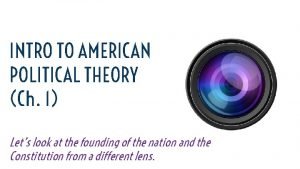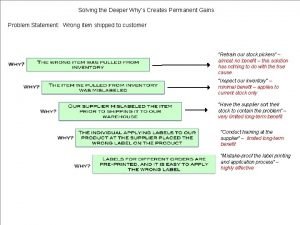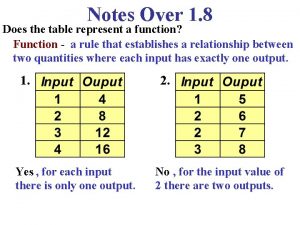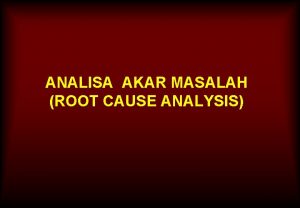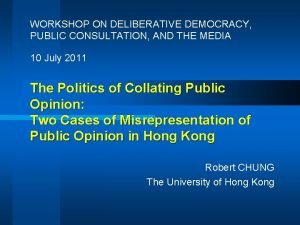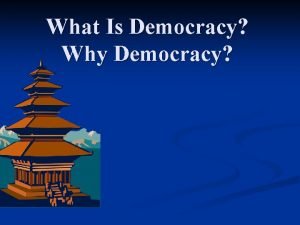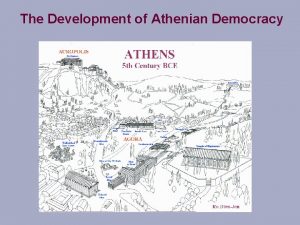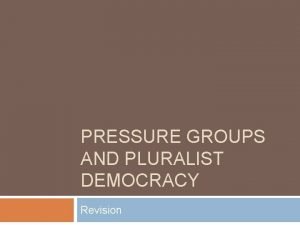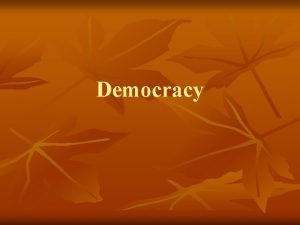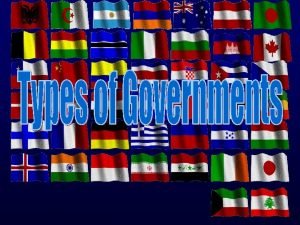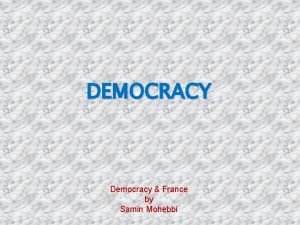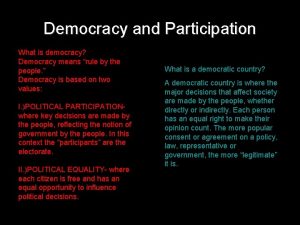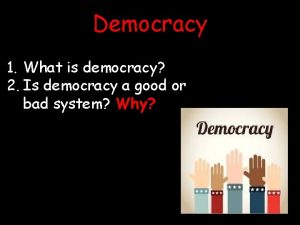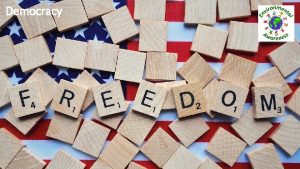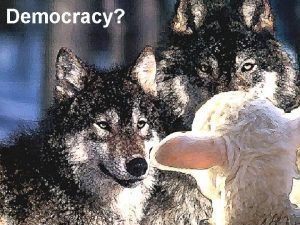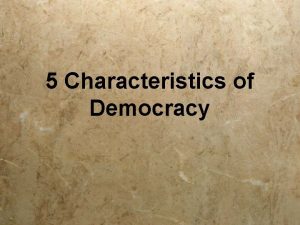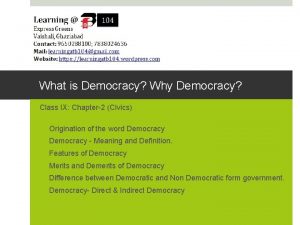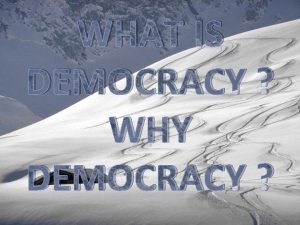What is Democracy Why Democracy What is Democracy
















- Slides: 16

What is Democracy? Why Democracy?

What is Democracy? A simple definition of democracy Democracy is a form of government in which the rulers are elected by the people. This definition allows us to Separate democracy from forms of government that are clearly not democratic. Example : Saudi Arabia rule not because of people have chosen them to do so but because they happen to be born into royal families.

Features of Democracy We have started with a simple definition that –democracy is a form of government in which the rulers are elected by the people. This raises many questions Who are the rulers in this definition? What kind of election constitutes a democratic election? Who are the people who can elect the rulers or get elected as rulers? Finally , what kind of form of government is democracy?

Major decisions by elected leaders In Pakistan, general Pervez Musharraf led a military coup in October 1999. He overthrew a democratically elected government and declared himself the ‘Chief Executive’ of the country. In 2002 , he held a referendum in the country which was based on malpractices and fraud that granted him a five -year extension. After passing law, 'Legal Framework Order’ which gave the president the power to dismiss the national and provincial assemblies. In this case , Pakistan has had election, elected representatives had some power. But the final power rets with the military officers and general Musharraf himself. So this should not be called a democracy. In a democracy, the final decision making power must rest with those elected by the people. This gives us the first feature.

Free and fair electoral competition CHINA In China , elections are regularly held after every five years for electing the country’s parliament called the National People’s Congress. Before contesting elections, a candidate needs the approval of Chinese communist Party. It has nearly 3000 members elected from all over China The government is always formed by Chinese communist Party.

Free and fair electoral competition MEXICO Mexico holds election after every six years to elect its president. But until 2000, every election was won by a party called PRI(Institutional Revolutionary party) Opposition Parties did contest elections , but never managed to win as PRI was known to use many dirty tricks to win elections. What are the dirty tricks ? All those who were employed in government offices had to attend its party meetings. Teachers of government schools used to force parents to vote for the PRI. Media largely ignored the activities of opposition political parties except to criticize them. Sometimes the polling booths were shifted from one place to another in last minute. The PRI spent a large sum of money in the campaign for its candidates. Both the cases (china and Mexico) should not be called a democracy. A democracy must be based on a free and fair election where those currently in power have a fair chance of losing

One person, one vote , one value The principle of universal adult franchise has now been accepted almost all over the world. There are many instances of denial of equal right to vote. In Saudi Arabia women do not have the right to vote. Estonia had made its citizenship rules in such a way that people belonging to Russian minority find it difficult to get the right to vote. In Fiji, the electoral system is such that the vote of an indigenous Fiji has more value than that of an Indian-Fijian. In democracy , each adult citizen must have one vote and each vote must have one value.

Rule of law and respect for rights Since independence , Zimbabwe ruled by ZANU-PF. Its leader Robert Mugabe , has been ruling the country. He is popular but also uses unfair practices in elections. Elections have been held regularly and always won by ZANU-PF. Opposition party workers are harassed and their meetings disrupted. Public protest and demonstrations against the government are declared illegal. Television and radio are controlled by the government and give only the ruling party's version. The government has ignored some courts judgements that went against it and has pressurized judges. In this case , government is not democratic as there is no citizens basic rights , no political opposition, no judiciary. A democratic government rules within limits set by constitutional law and citizens’ right.

Summary definition Let us sum up the discussion so far: Accordingly , democracy is a form of government in which: Rulers elected by people take all major decisions; Elections offer a choice and fair opportunity to the people to change the current rulers This choice and opportunity is available to all the people on an equal basis The exercise of this choice leads to a government limited by basic rules of the constitution and citizens’ right.

Why Democracy? Arguments against democracy Leaders keep changing in a democracy. This leads to instability. Democracy is all about political competition powerplay. There is no scope for morality. So many people have to be consulted in a democracy that it leads to delay. Elected leaders don't know the best interest od the people. It leads to bad decisions. Democracy leads to corruption for it is based on electoral competition. Ordinary people don't know what is good for them, they should not decide anything.

Arguments for Democracy Lets start with an example: -China’s famine of 1958 -1961 How in India existence of democracy helped to avoid famine in comparison to China? It was the worst recorded famine in world history. Nearly three crore people died in this famine. Economists think that this was a result of different government policies in the two countries. The existence od democracy in India made the Indian government respond to food scarcity in such a way that the Chinese government did not They point out that no large-scale famine has ever taken place in an independent and democratic country. If China too had multi party election, an opposition and a press free to criticize the government , then so many people may not have died in the famine.

Arguments for Democracy A democratic government is a better government because it is more accountable form of government Democracy improves the quality of decision making. Democracy enhances the dignity of citizens Democracy is better than other forms of government because it allows us to correct its own mistakes.

Broader Meanings of Democracy So we understood democracy as a form of government. The most common form that a democracy takes in our times is that of a representative government. The majority of people rule through their elected representatives. This becomes necessary because : Modern democracies involve such a large number of people that is physically impossible for them to sit together and take a collective decision Even if they could, the citizens doesn't have the time, the desire or the skills to take part in all the decisions

Broader Meanings of Democracy Sometimes we use democracy for organisations other than the government. The word democracy go back to its basic sense of a method of taking decisions. How do you think democracy can be applied to other spheres of our life ? A democratic decision involves consultation with and consent of all those who are affected by that decision Those who are not powerful have the same say in taking the decision as those who are powerful This can apply to a government or a family or any other organisation. Thus , democracy is also a principle that can be applied to any sphere of life

Broader Meanings of Democracy from other forms of governments Other forms of governments like Monarchy, dictatorship or one –party rule don't require all citizens to take part in politics. In fact most non-democratic governments would like citizens not to take part in politics. But democracy depends on active political participation by all the citizens. That is why a study of democracy must focus on democratic politics.

 Hey hey bye bye
Hey hey bye bye Don't ask why why why
Don't ask why why why Parlimentary system
Parlimentary system Why is hyperpluralism bad for democracy
Why is hyperpluralism bad for democracy Why-why analysis
Why-why analysis Why do you cry willie
Why do you cry willie Does the table represent a function why or why not
Does the table represent a function why or why not What does a table represent
What does a table represent Why or why not
Why or why not Metode analisa masalah
Metode analisa masalah Conclusion on democracy
Conclusion on democracy Simple definition for democracy
Simple definition for democracy Democracy meaning
Democracy meaning The development of athenian democracy
The development of athenian democracy Cold war pictoword
Cold war pictoword Pluralist democracy
Pluralist democracy Democracy vs monarchy
Democracy vs monarchy

